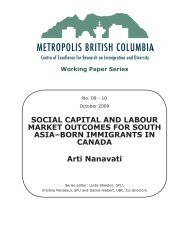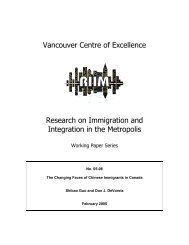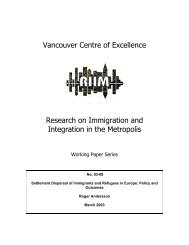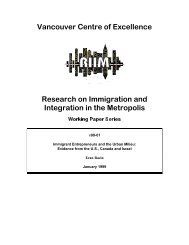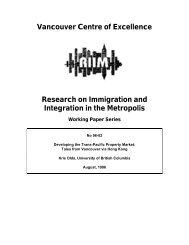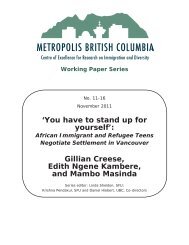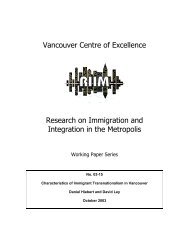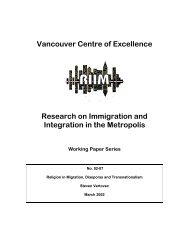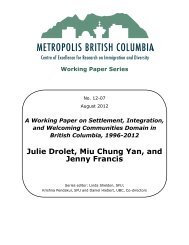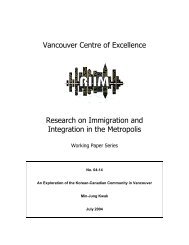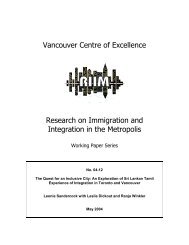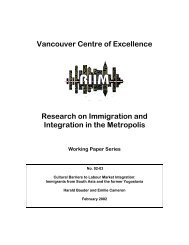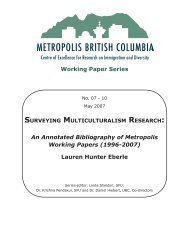Modernization and Global Restructuring of Women's Work
Modernization and Global Restructuring of Women's Work
Modernization and Global Restructuring of Women's Work
Create successful ePaper yourself
Turn your PDF publications into a flip-book with our unique Google optimized e-Paper software.
13<br />
Scene Two: The World My Mother Gave Me<br />
Addressing the theme <strong>of</strong> a conference, “the world my mother gave me,” Himani Bannerji (2001:2)<br />
observes that “our mothers are/were not in a position to give us much <strong>of</strong> the world, which mostly lay<br />
beyond their reach. Yet, they did leave us with an inheritance <strong>of</strong> a longing for the out-<strong>of</strong>-reach<br />
world.” Women’s need to occupy a wider space <strong>of</strong> activity <strong>and</strong> movement in history, Bannerji notes,<br />
may be achieved generationally where women are simultaneously mothers <strong>and</strong> daughters. “This does<br />
not have to be, perhaps <strong>of</strong>ten is not, a conscious decision, but lived movements <strong>of</strong> <strong>and</strong> through<br />
history, <strong>of</strong> women designing, re-writing their ‘selves,’ embodying the stories <strong>of</strong> being <strong>and</strong> becoming.”<br />
While Nadia was preparing herself for school/outside life, she does not dismiss her mother’s<br />
interior world <strong>of</strong> home as insignificant. She considers it as an integral part <strong>of</strong> her story <strong>of</strong> being <strong>and</strong><br />
becoming.<br />
My father used to work in the refinery company <strong>and</strong> my mother was a housewife <strong>and</strong><br />
remained at home to take care <strong>of</strong> six children. She married my father when she was<br />
twelve years old <strong>and</strong> my father was forty years old at the time, a big age difference.<br />
Nadia’s pragmatic point <strong>of</strong> interjection into the popular discourse <strong>of</strong> early marriage equals<br />
oppression is worthy <strong>of</strong> note. She observes that her mother was an orphan <strong>and</strong> as such marriage gave<br />
her the opportunity to enter into a role-filled (wife <strong>and</strong> later a mother) relationship as opposed to<br />
depending on her uncle for support. Within a short period <strong>of</strong> time, her mother became a widow.<br />
I was twelve years old when my father retired <strong>and</strong> my mother insisted that we move<br />
to another city, Quay. She insisted because she wanted to live close to her uncle who<br />
at that time was living in Quay. We moved to Quay <strong>and</strong> after a month my father<br />
became ill <strong>and</strong> passed away. My thirty-year-old mother was left with six young<br />
children <strong>and</strong> some savings at the bank <strong>and</strong> monthly pension <strong>of</strong> my father. We bought<br />
a house to live in <strong>and</strong> we had a simple condition <strong>of</strong> living. At that time I was in high<br />
school.<br />
Nadia expressed admiration for her mother (an illiterate woman) for taking on the<br />
responsibility <strong>of</strong> raising six children (three sisters <strong>and</strong> three brothers) on her father’s pension. She<br />
does not frame this event as something that her mother coped with in the absence <strong>of</strong> any other choice.<br />
She portrays her mother as someone who took charge <strong>of</strong> the house with realistic expectations that<br />
they were going to have “a simple condition <strong>of</strong> life.” This observation draws our attention to the fact



